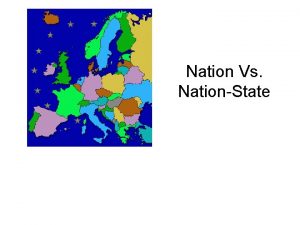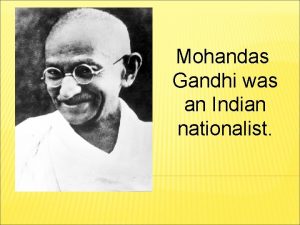Nationalist Leaders Leader Mohandas Gandhi Nation India Leader





- Slides: 5

Nationalist Leaders • Leader: Mohandas Gandhi • Nation: India • Leader: Emperor Meiji • Nation: Japan

Historical Circumstances: India is a Colony of Great Britain. It is the “crown jewel” of the British Empire because it is very Rich in Resources. India is colonized because they are not united socially or politically to defend themselves. After WWI – There is a major movement of nationalism and self determination. Nationalism – Pride and love in one’s country Self Determination – Desire to be free of imperial rule, Rule your own nation. Amritsar Massacre – Indians (Hindus and Muslims) are violently massacred by British troops. This massacre unites Hindus and Muslims for nationalism. Gandhi is Western Educated and rises to power as a Nationalist leader in India Civil Disobedience – Refusal to Obey Unjust Laws Non-Violent Protest – Desire to achieve goals without the use of violence Gandhi wants to undermine British authority in India without violence Salt March – Gandhi leads followers on a March to Indian ocean to make Salt. Protest against British Taxes on Salt Homespun Movement – Gandhi encourages Indians to make their own clothing/textiles to avoid supporting British Industries. There is growing tension in India between Hindus (majority) and Muslims Hunger Strike – Gandhi Fasts (Doesn’t Eat) to end violence between Hindus/Muslims

Impact on their people and nation • Gandhi Achieves Indian Independence from British Colonial Rule. • India is partitioned into India for Hindus and Pakistan for Muslims. • India struggles to overcome the negative aspects of Colonial Rule. Cash crop economy doesn’t meet the needs of the people – need for GREEN REVOLUTION.

Historical Context: Japan is an archipelago (chain of Island) and is geographically isolated. Japan is based on a feudal structure (Shogunate). Japan recognizes Europeans are interfering in China and want to avoid the same. They transform from a feudal state to a modern Monarchy under emperor Meiji. Emperor Meiji leads a period of rapid westernization and Modernization – The Desire to become modern and technologically advanced. Westernization – Process of become more like the Industrialized West (Western Europe) Japan becomes imperialistic as they industrialize. Imperialism – Process by which a stronger country takes over a weaker country. Industrialization – Process by which a country builds up industries and develops a factory system. - Creates transportation network - Reforms banking, government, social classes

Impact on the People and Nation • Japan becomes a modern industrial nation • Industrialization creates a need for Raw Materials Japanese Imperialism • Japan invades Manchuria, Korea and China • Advanced transportation and communication systems. • Westernizes so they KEEP OUT THE WEST • Imperialism (Military Aggression) gets Japan involved in WWII









